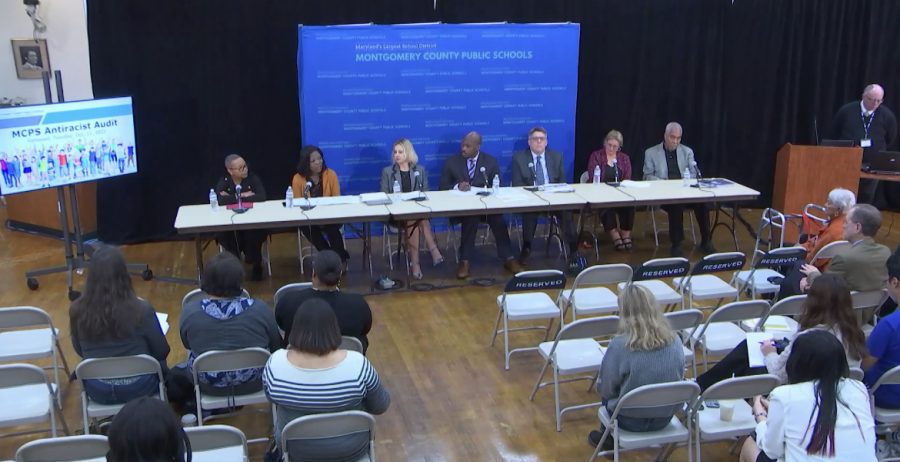MCPS releases audit, highlights county issues
On October 10, 2022, the BOE met to announce the results of the System Wide Anti-Racist Audit.
December 2, 2022
Questions regarding whether racism is frequent across MCPS schools and plays a factor in students’ learning have recently been a prevalent topic inside the community. Finally, after examining countless documents, conducting numerous focus groups and community conversations and conducting a county-wide survey, on Oct. 10, those questions were answered during the release of the highly anticipated Anti-Racist Audit Report at the MCPS Board of Education (BOE) office.
“The coherence part of the audit speaks to the district needing to prioritize and develop a coherent systemic plan and define a series of priorities to address the issues identified in this report,” MCPS Superintendent Monifa McKnight said at the Oct. 10 briefing. “This plan should be constructed with the community and articulate a vision and strategy for district improvement across the entire organization. That means we essentially remove the fragmentation that has prevented us from moving forward.”
The audit has been in discussion for years and hopes to resolve a problem embedded from the beginning. When MCPS was founded in 1860, only white students were allowed to attend and in 1872, African American students could attend segregated schools. It would be almost 100 years later, in 1954, following the decision of the Brown versus Board of Education Supreme Court case, in which colored students were integrated into the MCPS school system.
To no shock, the results are clear: systematic racism is prevalent across MCPS. This idea has been speculated for a while, but now the audit can confirm those speculations.
“I am pleased to have the affirmation of what we have known for years and what student performance data tells us — that students of color have a different experience in our school system,” McKnight said. “If we are truly going to ensure that all students can succeed, we must eliminate racism in bias in teaching and learning.”
According to the System Wide Anti-Racist results, 21.5 percent of students agreed with the statement that “I feel like staff at my school make assumptions about my behavior based on my racial identity” and 42.7 percent of administrators in MCPS agreed that “Some students at my school are treated differently because of their race, skin color, ethnicity or culture.” Additionally, 54 percent of administrators and 34 percent of teachers expressed “uncertainty that school administration and/or the district address reports about bullying, discrimination, or harassment.”
“I think the main thing the county is looking at is how we can have a more coherent system and what are the best practices schools across the county are using and how we can make sure we’re doing that for all the 210 schools,” WCHS Principal John Taylor said. “That’s really the county goal is system-wide coherence and setting up accountability measures so we can be like, “We want to improve in these areas; how are we going to measure that and how do we make sure that that is actually happening?”
The main focus of MCPS is to ensure each school in the county implements the anti-racist policies. As the anti-racist policies have been pushed aside and ignored, parental concerns about the discriminatory treatment toward their children have risen.
“When I took this seat [as superintendent], I said that I think of the 161,000 students in the system as I do my own son,” McKnight said. “If I were to look at the predictors of that data, he would be grouped into one of those groups where the data does not look positive. That concerns me, it upsets me and it makes it not okay.”
As seen in the audit results, family members who were African American, Middle Eastern and North African, American Indian and Alaska Native, Multiracial and Native Hawaiian/Pacific Islander agreed much less with the statement that “My child’s school engages my family in ways that respect and honor our culture.”
“Students and families feel that incidents happen and they are not being responded to appropriately,” Taylor said. “There’s no transparency around that process, so that’s something we can improve on. Some of the communication recommendations like making sure items are translated or easily translated so that all of our families are easily reached out to.”
Concerned students and parents have felt as though schools do not know how to properly address the discriminatory occurrences that have taken place across the county. So, MCPS is striving for their staff to receive proper training regarding how they should manage the racism they see.
“We need to make sure our staff members across the board know how to handle these situations [where students and staff are directly targeted] so that they can handle it right then at the moment and take care of it and address it so that it doesn’t get ignored,” Taylor said. “What I’ve heard over the years with staff members is that sometimes it’s hard to address those things since they don’t know what to say and don’t know how to address it, so when they don’t feel like they have the tools to address it, it’s easier to pretend you didn’t hear it.”
Although there are a variety of issues that MCPS needs to address, the No Place For Hate efforts should not be belittled. What the county must focus on is for this hate-free mindset to be applied to every student, staff member and parent throughout MCPS.
“There are things that are good that are happening around the county; what isn’t happening is making sure that it’s happening at every school,” Taylor said. “It raises the question of how can we make sure all of the teachers have had these conversations.”
The main focus of the audit was for coherence across the county about how to address issues regarding racism. Schools’ students, parents and staff have seen mixed reactions and results over the years from how these incidents have been constructed. The ultimate question that the audit has brought is if the results that schools received will change anything in the implemented policies.
“Something that was clear in the audit is that the process isn’t transparent so people don’t trust that schools are actually going to handle the racism that they or their parents have experienced multiple times throughout their lives,” Taylor said. “We can only earn that trust by consistently addressing issues. The reason we are a No Place For Hate school is to really say what our clear expectations are by addressing this: This is what we want at [WCHS], and this is what we expect.”




